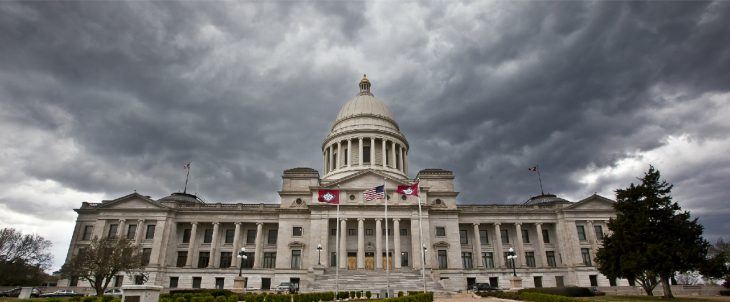Gun bill debate dominates last day of legislative session (UPDATED)
by April 27, 2021 3:53 pm 1,933 views

The final day of the regular session was a virtual shootout over a variety of gun bills aimed at correcting a controversial measure vetoed by Gov. Asa Hutchinson.
Last Friday, Hutchinson vetoed SB 298, a bill that would allow local and state law enforcement to not cooperate with federal law enforcement in certain instances. SB 298, the Arkansas Sovereignty Act of 2021, was sponsored by Sen. Gary Stubblefield, R-Branch, and Rep. Brandt Smith, R-Jonesboro. On Monday, Stubblefield led the Senate to override that veto after lawmakers argued for an hour on the issues raised by the veto.
On Tuesday (April 27), two new paths were forged regarding the controversial gun rights legislation. HB 1957, supported by House and Senate leadership, sought to clear up concerns raised by prosecutors, sheriffs and the Arkansas Game & Fish Commission. Stubblefield presented a new bill, SB 717, which also focused on clearing up legal issues previously raised.
Rep. Jeff Wardlaw, R-Hermitage, was the House sponsor of HB 1957. He said a number of definitions in the new bill would address concerns. It also added punishments for violators but set up due process for certain circumstances.
“All federal acts, laws, orders, rules, and regulations that were enacted on or after January 1, 2021, that infringe on the enumerated rights under Arkansas Constitution, Article 2, are invalid in this state, shall not be recognized by this state, are specifically rejected by this state, and shall be considered null and void and of no effect in this state,” the bill states.
“There is nothing I care more about than my family, God and Jesus than my guns,” Wardlaw told House members in committee before the floor vote.
Rep. Ashley Hudson, D-Little Rock, spoke against the bill. She said Arkansas legislators cannot write a law to supersede federal law. The courts would be the arbiter of conflicts between local and state law and federal law, she said. Hudson warned that a similar law in Kansas had the adverse effect of causing two gun owners to lose their gun rights.
“We put our constituents in jeopardy by allowing them to believe they have a defense. They don’t,” Hudson said of state efforts to overturn federal mandates.
After a half-hour debate, the House passed HB 1957 by a 75-19 margin. It now heads to the Senate for consideration.
Immediately after its passage, Rep. Smith pushed for an override of Gov. Hutchinson’s veto of SB 298. A substitute motion was made to lay the vote on the table for the override, effectively postponing a vote until the Senate takes action on HB 1957.
Behind-the-scenes wrangling took place throughout most of the afternoon before legislators agreed on a plan that played out after midnight, taking the session into Day 108.
The Senate approved HB 1957 in a midnight meeting by a 26-6 margin. The bill was then transferred to the House where it ran quickly through the House State Agencies committee to concur in a Senate amendment that made a technical correction and added sponsors. Then, the full House voted to concur the amendment in the bill on a 79-20 vote.
It now heads to Gov. Asa Hutchinson, who has five days to act on the measure. The House did not take up the veto override of SB 298 that was tabled earlier.
Both chambers are in an extended recess and are not expected to reconvene until later this year.
OTHER BUSINESS
Lawmakers also sent a third constitutional amendment for consideration by voters in 2022. SJR 14, the Arkansas Religious Freedom Act, was approved by House members on a 75-19 margin. It had already cleared the Senate and will be on the general election ballot next year.
The resolution seeks to amend the state constitution to prohibit the government from burdening a person’s freedom of religion. If approved, it would more deeply enshrine religious freedom against potential federal law, according to supporters.
Two other measures were previously referred to voters. One includes a proposal to require a 60% threshold for approval of a constitutional amendment or initiated act. A second proposal would allow the legislature to call itself into special session.
